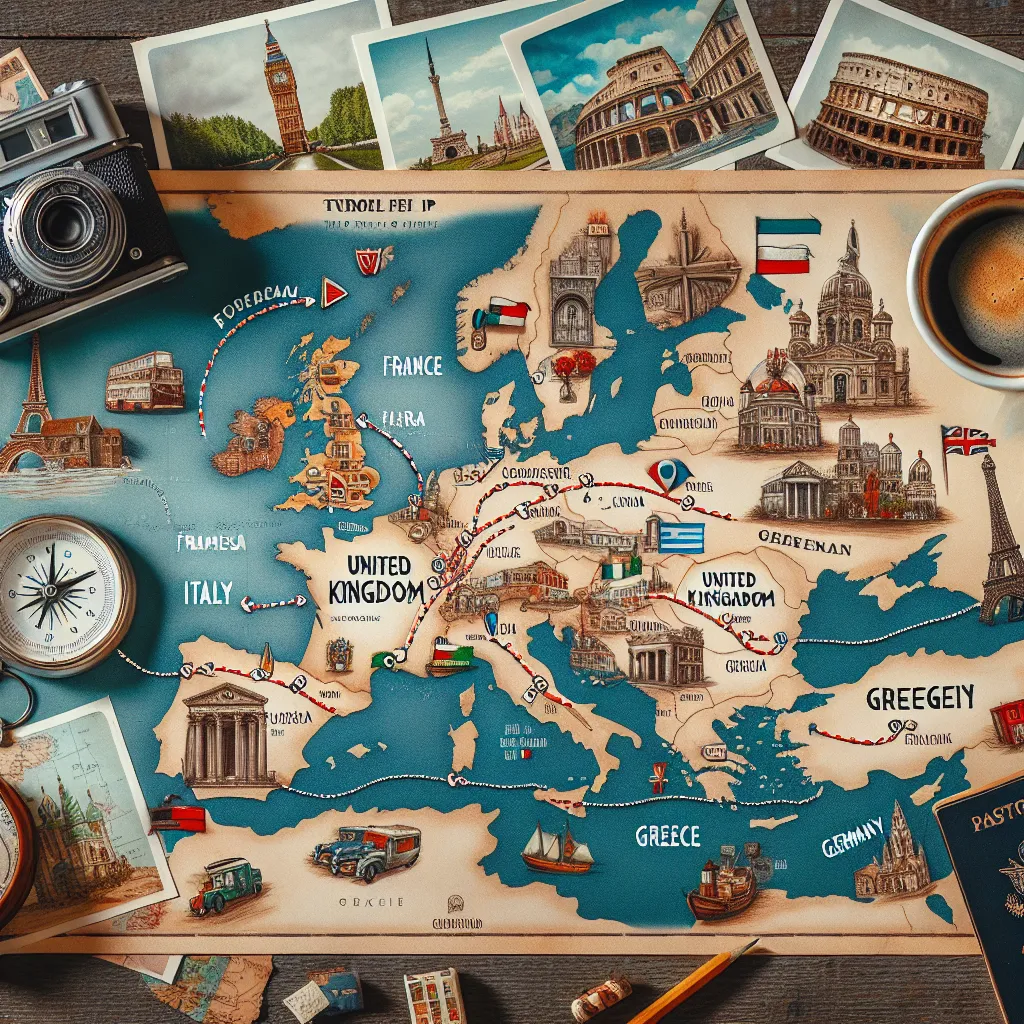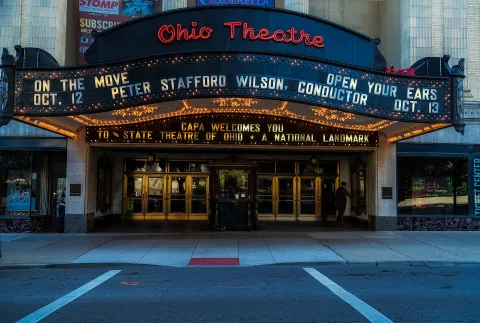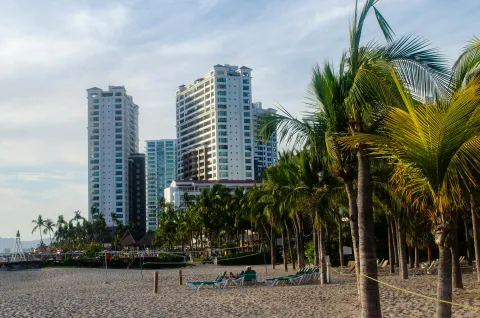Crafting the perfect Europe itinerary can be a thrilling yet daunting task. With so many diverse destinations, it's easy to feel overwhelmed.
Whether you're planning a quick day trip or a comprehensive 6-week Europe travel itinerary, this guide is for you. It's designed to help you navigate the planning process with ease.
We'll delve into everything from visa requirements to cultural etiquette. We'll also explore how to balance popular tourist spots with hidden gems.
This guide will also provide tips on leveraging technology for your trip. From travel apps to online resources, you'll learn how to make the most of your journey.
So, whether you're a first-time traveler or a seasoned globetrotter, these essential tips will help you craft an unforgettable Europe trip itinerary. Let's embark on this exciting journey together.
Understanding the Scope of Your Trip
The first step in planning your Europe travel itinerary is defining your trip's duration. Are you heading to Europe for a quick day trip or an expansive 6-week journey? The length of your stay will guide your itinerary decisions.
Knowing your travel timeframe helps you set realistic expectations. It prevents over-packing your schedule, leaving room for spontaneous adventures. Longer trips provide flexibility, allowing you to visit more destinations at a relaxed pace.
Once your trip length is determined, consider the regions you wish to explore. Europe offers vastly different experiences, from the romance of Western Europe to the rich history of Eastern Europe. Choosing your focus area is key to crafting a cohesive and fulfilling itinerary.
Keep your interests at the forefront when selecting destinations. Whether you're captivated by art, history, or culinary delights, tailor your itinerary to include destinations that align with these preferences.
Here's a quick list to guide your initial planning:
- Define your trip duration: day trip to 6 weeks
- Decide on regions: Western, Eastern, or a combination
- Focus on personal interests: history, food, art
- Allow time for unplanned adventures
- Balance popular spots with lesser-known gems
Understanding your trip's scope ensures a balanced and rewarding European adventure. It sets the stage for a memorable journey tailored to your unique preferences.
Timing is Everything: Seasonal Considerations
Seasonal timing profoundly impacts your trip to Europe. Each season offers distinct experiences, affecting everything from weather to local festivals. Consider these factors when planning your Europe trip itinerary.
Spring and fall are often ideal for avoiding the summer tourist rush. These shoulder seasons provide mild weather and fewer crowds. You'll find it easier to explore attractions without long wait times and high prices.
Summer is peak tourist season, bringing lively events and outdoor activities. However, prepare for heat and high accommodation costs. If you plan a summer visit, book accommodations early to secure the best options.
Winter in Europe means festive markets and snow-capped landmarks. This season suits travelers seeking cozy atmospheres, skiing, and holiday celebrations. Yet, some attractions may have limited hours or closures.
Choosing the right season for your travel preferences enhances your Europe experience. Consider weather patterns, crowds, and special events when finalizing your itinerary. The right timing ensures your trip aligns perfectly with your expectations and interests.
Visa Requirements and Entry Formalities
Visa requirements vary across Europe, depending on your nationality and planned itinerary. Early research helps you prepare for smooth entry into each country. Understand the specific documentation needed for your Europe trip itinerary.
Some European countries belong to the Schengen Zone, where one visa grants access to 27 countries. Check your eligibility and required application process well in advance. It's crucial to ensure your passport has enough validity for your travels.
Also, explore entry formalities beyond visas, such as vaccinations or health forms. Being informed about these requirements prevents last-minute travel issues. Proper planning ensures you enjoy a worry-free trip across Europe.
Prioritizing Destinations: Aligning Interests with Locations
Choosing destinations is a key step when crafting your Europe travel itinerary. Your interests should play a significant role in this decision. Whether you are keen on art, history, food, or nature, Europe has something for everyone.
Start by listing countries or cities that intrigue you. Research each destination to understand what it offers. Align these features with your passions to create an exciting itinerary.
Consider variety when planning your trip to Europe. Mix bustling cities with quaint towns or natural landscapes. Experiencing diverse destinations enriches your travel adventure.
Here's a simple guide to help prioritize:
- Art and History Buffs: Explore Rome, Athens, and Paris.
- Food Lovers: Visit Italy, Spain, and France.
- Adventure Seekers: Head to Switzerland, Norway, or Scotland.
- Culture Enthusiasts: Experience Turkey, Prague, and Vienna.
Don’t overcrowd your schedule. Each location deserves ample time to absorb its essence fully. Balance your Europe trip itinerary to include must-see sites alongside lesser-known spots. A thoughtfully crafted itinerary ensures a rewarding and memorable journey.
Balancing Attractions: Tourist Hotspots vs. Hidden Gems
Creating a balanced Europe travel itinerary involves mixing popular destinations with lesser-known areas. Famous landmarks like the Eiffel Tower or the Colosseum are classics for a reason. However, stepping away from the crowds can offer unique experiences.
Planning should involve careful consideration of your energy and time. Popular tourist spots, although fascinating, can be overwhelming due to crowds. In contrast, hidden gems provide a quieter experience, allowing for reflection and a deeper connection with the place.
Research is essential when seeking out these lesser-known spots. For example, while in Paris, explore the charming streets of the Marais, away from tourist-heavy areas. Consider visiting smaller towns with unique character, such as Hallstatt in Austria or Český Krumlov in the Czech Republic.
Balancing both types of attractions enriches your trip. Popular sites introduce you to iconic experiences, while hidden gems offer authenticity and tranquility. This approach allows for a comprehensive and enjoyable journey through Europe.
Transportation: Getting Around Efficiently
Efficient transportation is crucial for a smooth Europe trip itinerary. Planning how to move between destinations affects both your budget and time. Europe offers a multitude of transportation options to suit every traveler's needs.
Trains are a popular choice across the continent. The Eurail Pass, for instance, provides flexible, cost-effective travel across multiple countries. It allows you to experience the scenic beauty of Europe while moving comfortably between cities.
Air travel can also be economical, particularly for longer distances. Budget airlines, such as Ryanair and EasyJet, offer competitive fares. It’s essential to consider the proximity of airports to city centers to minimize transit time.
Car rentals offer freedom and flexibility, especially in rural areas. This option is ideal for exploring regions like Tuscany or the Scottish Highlands. However, be mindful of local driving regulations and parking availability.
To summarize, when planning transportation, consider a mix of the following:
- Trains for comfort and scenic routes
- Budget flights for long distances
- Car rentals for rural exploration
Public transportation, like buses and trams, is excellent for inner-city travel. Cities such as Berlin and Amsterdam have efficient systems, making it easy to explore. Consider purchasing city transport passes for unlimited travel during your stay.
Accommodation: Booking the Best Options for Your Budget
Choosing the right accommodation is pivotal for an enjoyable trip to Europe. Options abound, from luxury hotels to budget-friendly hostels. It's important to select accommodations that align with both your preferences and your budget.
Hotels offer comfort and amenities, often boasting central locations near tourist hotspots. For those seeking convenience and privacy, hotels are a reliable choice. However, consider booking early, especially in peak seasons, to secure the best deals.
Hostels are excellent for budget travelers, providing a social atmosphere and cost-effective lodging. Many hostels feature communal kitchens, allowing you to cook your meals and save on dining expenses. This option also provides opportunities to meet fellow travelers and exchange experiences.
Vacation rentals, such as Airbnb, offer home-like stays that can enhance your travel experience. This choice is ideal for families or groups seeking more space and a local vibe. Look for rentals with positive reviews and clear amenities to ensure a pleasant stay.
In summary, whether you seek luxury, economy, or space, accommodations should reflect your travel style and financial plan.
Cultural Immersion: Customs, Etiquette, and Language
Traveling to Europe offers the chance to experience diverse cultures. Understanding local customs can greatly enhance your trip. Each European country has its own unique traditions and etiquette.
Learning some basics of the local language shows respect and can improve interactions. Simple phrases like "hello," "thank you," and "please" go a long way. Many Europeans appreciate visitors’ efforts to communicate in the native tongue.
Etiquette varies from country to country. In Italy, arriving late is often acceptable, while in Germany, punctuality is valued. Researching and respecting these differences can help avoid social faux pas.
Familiarize yourself with local customs like tipping practices and dining etiquette. Some countries, like Spain, have distinct dining times which can affect meal planning. Understanding these nuances will provide deeper cultural insights and leave a positive impression.
Embracing the cultural aspects of your destinations can enrich your European adventure, leaving you with memorable and meaningful experiences.
Packing Smart: Essentials for a European Adventure
Packing for a European trip can seem daunting. A well-thought-out packing list can ease your travel experience. Aim to pack light yet versatile.
Consider the diverse climates you might encounter across Europe. From sunny Mediterranean beaches to chilly Nordic countries, the weather varies. Layering is key for adapting to temperature changes.
Focus on versatile clothing items that can be mixed and matched. Opt for neutral colors that can easily complement each other. Comfortable shoes are a must, given the amount of walking you'll likely do.
To help you prepare, here are some packing essentials:
- Lightweight clothing suitable for layering
- A water-resistant jacket or umbrella
- Comfortable walking shoes
- Travel-sized toiletries
- Necessary adapters for electronics
- Basic medications and first-aid supplies
- Refillable water bottle
Don't forget to secure important documents like your passport and travel insurance. Having electronic backups of these is also wise. Packing smartly helps ensure a stress-free start to your European adventure.
Leveraging Technology: Travel Apps and Online Resources
Technology can be your best ally when exploring Europe. Travel apps offer invaluable guidance, making planning and navigation smoother. They help optimize time and resources during your journey.
Consider downloading apps before departure. This ensures offline access to critical information, even in areas with limited internet. Updated apps guarantee the latest data, enhancing accuracy and reliability.
Here’s a list of recommended travel apps and resources:
- Google Maps: Essential for navigation and finding nearby attractions.
- Duolingo: To learn basic phrases in the local language.
- TripIt: Organizes your itinerary and travel plans.
- XE Currency: Easy currency conversion on the go.
- Rome2rio: Provides comprehensive transport options between destinations.
Online platforms like travel forums and blogs offer firsthand advice from seasoned travelers. Online reviews help identify quality accommodations and attractions. Utilizing technology allows for a well-informed and enjoyable European adventure.
Planning for Downtime and Spontaneity
While crafting a Europe trip itinerary, it's crucial to include time for relaxation. Constant movement can lead to travel fatigue. Scheduling breaks allows you to recharge and enjoy the journey more.
Spontaneity adds a touch of adventure to your travels. Leave space in your itinerary for unexpected discoveries. Sometimes, the best experiences happen when you're not rushing to the next destination.
Balancing structured activities with free time enhances your overall experience. It allows for flexibility in case something intriguing catches your eye. Remember, some of the most memorable moments come from unplanned adventures.
Local Events and Festivals: Enhancing Your Experience
Experiencing local events can add rich depth to your Europe travel itinerary. Festivals offer a glimpse into the traditions and cultural vibrancy of a destination. They are an excellent way to see how locals celebrate and come together.
Research upcoming events before your trip to Europe. You might find unique festivals or seasonal celebrations that pique your interest. Whether it's a food fair or music festival, participating will enrich your journey.
Keep in mind the timing and location of these events. Adjust your itinerary to include these opportunities for unforgettable cultural experiences. Attending local festivities can create lasting memories on your European adventure.
Budgeting and Expense Tracking
Staying mindful of your budget is essential for a stress-free Europe trip. A well-planned budget helps you make informed spending decisions. It's vital for enjoying all that Europe has to offer without financial strain.
Start by outlining major expenses, such as transportation, accommodation, and meals. Research costs for activities and potential splurges. This foresight ensures you're prepared for both expected and unexpected expenses.
Consider using budgeting apps to track spending in real time. Many apps provide insights on how your expenses align with your budget plan. Staying aware of your financial situation allows for adjustments when necessary.
Remember these key budgeting considerations:
- Allocate funds for emergencies and surprises
- Monitor foreign exchange rates
- Prioritize spending on meaningful experiences
- Keep a mix of cash and cards for convenience
By tracking expenses closely, you maintain control over your finances. This approach lets you focus more on enjoying your travel experience.
Safety, Health, and Insurance
Traveling comes with both excitement and unpredictability. Prioritizing your safety and health is key for a successful Europe travel itinerary. Being proactive about potential risks is essential when planning any trip to Europe.
Secure comprehensive travel insurance before departure. This coverage safeguards against unforeseen medical and travel-related issues. Investigate options that fit your journey's specific needs, such as coverage for outdoor activities or long stays.
Stay informed about the local health and safety conditions. Familiarize yourself with emergency services and healthcare facilities in your destinations. Knowing how to quickly access help can be crucial if emergencies arise.
It's wise to have a small first-aid kit and any necessary medications on hand. Keep digital and physical copies of important health documents and travel insurance. This organized approach can help you navigate any challenges with ease and confidence.
Sustainable and Responsible Travel
Traveling responsibly can greatly benefit both the environment and local communities. Embracing sustainable practices on your Europe trip itinerary doesn't have to be challenging. Small, mindful choices can collectively have a significant positive impact.
Start by researching eco-friendly accommodations. Many hotels and hostels prioritize sustainability through energy conservation and waste reduction initiatives. Opting for these options supports businesses committed to preserving the environment.
Minimize your carbon footprint by utilizing public transportation or walking when possible. Exploring cities via bus, tram, or train is not only environmentally friendly but also offers authentic local experiences. If you need a rental, select hybrid or electric vehicles for added sustainability.
Consider the cultural and environmental impact of your activities. Respect local customs, protect wildlife, and avoid attractions that exploit animals or nature. Engage with community-led projects or volunteer opportunities to give back and make a meaningful difference during your travels.
Final Checklist Before Departure
Preparing a comprehensive checklist is crucial to ensure a smooth journey. It helps in avoiding last-minute stress before your trip to Europe. Make sure everything is in place before you leave.
First, verify all travel documents. This includes double-checking that your passport, visas, and tickets are up-to-date and accessible. Having both digital and physical copies can prevent headaches later.
Next, confirm your travel arrangements. Recheck accommodation bookings and any planned activities you’ve scheduled. Verify that all your transportation, including flights and trains, is booked and confirmed.
Here's a simple checklist to follow:
- Check passport and visa validity
- Confirm flight, train, and accommodation bookings
- Pack necessary adaptors and chargers
- Arrange travel insurance
- Set up a travel itinerary planner app
Take care of practical matters at home. Arrange for mail collection and inform your bank of your travel plans to avoid issues. Finally, make sure you feel comfortable and excited about your well-planned adventure.
Conclusion: Embracing the Journey
A European adventure is a thrilling opportunity that can enrich your life. Your well-crafted itinerary will help you make the most of each moment. Being flexible and open-minded allows you to appreciate the unexpected surprises that travel often offers.
Remember, the best travel experiences are not just about ticking destinations off a list. They are about embracing the culture, engaging with locals, and immersing yourself fully in each new environment. Allow yourself the freedom to explore beyond your plans.
Finally, reflect on your experiences at the end of each day. Capture memories through photos or journaling. This not only enhances your journey but leaves you with cherished stories to share.



